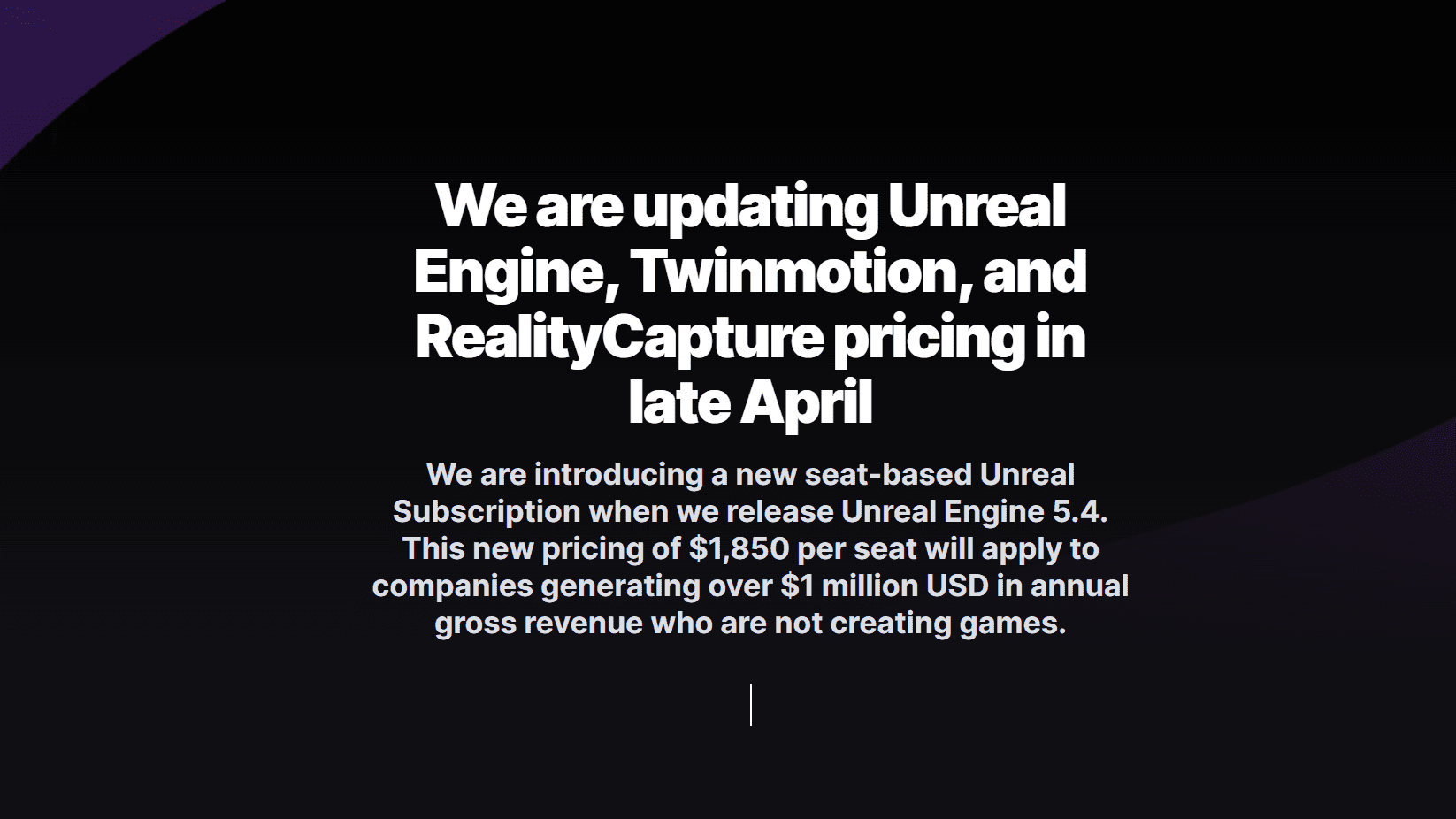Introduction
Last year, Epic announced they would introduce a paid subscription to Unreal Engine in 2024. However, there was little other information to go on, leaving users with lots of questions. Today, we finally got a price point as well as details on who it applies to and what would be included.
According to the blog post from Epic, this new pricing model applies to Unreal Engine 5.4 and later, which will ship in April this year. If you continue using 5.3 or earlier, the new price structure does not apply, so studios have plenty of time to decide how they’d like to proceed. Even then, not everyone will need to buy a license.

Cost
The main question everyone is going to ask is, “How much is it.” The Unreal Subscription will be $1850 per seat per year. This puts it higher than Adobe’s Creative Cloud (~$700/year) and about as much as an Autodesk Maya subscription ($1875/year). Meanwhile, it is much less than the Autodesk Media & Entertainment Collection ($2605/year). The price seems pretty fair compared to other subscriptions, such as Maxon One, V-Ray Premium, etc.
Who needs to pay
So, who will need to pay for this new Unreal subscription? According to the blog, there are a few criteria that you need to meet before you have to pay. First, your company must generate over $1 million in annual gross revenue. They do not specify that it is a million in revenue directly from the use of Unreal. A studio focusing on post-work and occasionally using Unreal would still apply. Also, note this is revenue, not profit, so this isn’t that high of a bar.
Second, this does not apply to those making games. Game studios instead pay through the standard royalties structure that has been in place for a while. The current standard for games applies after the first million dollars in lifetime revenue for that game. After that, it is 5% of the revenue. Again, there is no change to the existing game licensing.
Third, this does not apply to those creating applications that rely on Unreal Engine code at runtime and are licensed to third-party users. That would be applications such as Zero Density’s Reality Editor or the Pixotope Editor. Both of those are customized versions of Unreal Engine for virtual production. In those cases, the developers of the applications will be charged a revenue share licensing model, so they won’t need to pay a per-seat license. Because the end user is paying a licensing fee to the developer, and that developer then pays royalties to Epic, it all works out in the end.
Basically, this is targeted at those making films, TV shows, live events, broadcasts, and the like. It will also apply to those using Unreal Engine for other runtime experiences, but not then licensing it to an end user. They give examples of product configurators (very popular in the automotive industry) or theme park rides.
Also mentioned are those using Unreal Engine for architectural visualization or interactive walkthroughs. This isn’t as big of a change for this industry as Epic already offered Twinmotion as a paid option specifically for architects. Speaking of Twinmotion, some changes are coming to that.
What else is included
This Unreal Subscription will also include both Twinmotion and RealityCapture. These products already had licensing costs and will continue to offer standalone versions for those who do not want the full Unreal Engine product. In the case of Twinmotion, the price will actually go down from the current price of $749 to the new price of $445. Also, like Unreal Engine, it will also be free to hobbyists and businesses making less than $1 million in revenue. RealityCapture will continue to be $1250 per seat as it is now, but will drop the pay-per-input license. Instead, they will offer RealityCapture free to those making less than $1 million. This will open up RealityCapture to many more users.
Conclusion
This change comes as no surprise to anyone. Even before they announced this was coming last year, most users in virtual production knew that the free tool wouldn’t last forever. The truth is that Epic has been and needs to continue developing tools for non-game workflows. It isn’t realistic to think they would continue to invest time and money into these fields without an income source, especially considering all the recent layoffs in the gaming industry.
It is also very encouraging to see they are continuing with their free tier for students, enthusiasts, and small businesses, as well as opening up RealityCapture and Twinmotion to more people. This new pricing structure seems very fair to the vast majority of users. Hopefully, this means that more features will appear more often.
